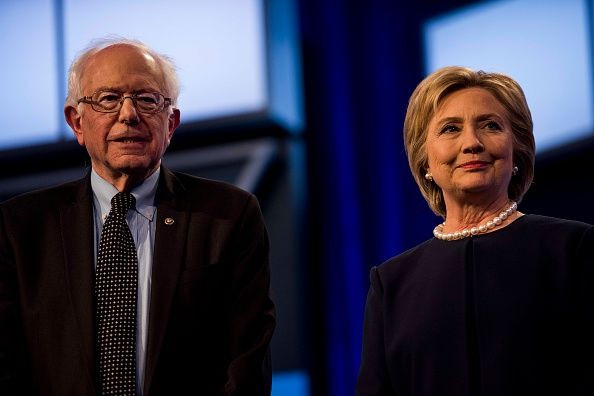The Next Primaries In 2016: What’s At Stake In Alaska, Washington, Hawaii Democratic Weekend Contests

Hillary Clinton and Bernie Sanders will face off Saturday in three Democratic nominating contests that are expected to give the Vermont senator a boost as he attempts to slow the former secretary of state’s progress toward the Democratic presidential nomination. Voters in Alaska, Hawaii and Washington are scheduled to cast their ballots Saturday, marking the only voting in an otherwise relatively quiet two-week period leading up to the April 5 Wisconsin primary for both parties.
While Sanders won the caucuses in Utah and Idaho Tuesday, Clinton took home a win in Arizona and maintained her significant lead in the pledged delegate count. As of this week, she has 1,223 delegates to Sanders’ 920. That count doesn’t include superdelegates, of which Clinton has 467, while Sanders has 26. Democrats need 2,383 delegates to win the nomination, so with Clinton’s 1,690 total she is well on her way.
However, Sanders’ campaign has repeatedly said it expects the upcoming contests to favor their candidate, and his wins Tuesday gave a sign that this may be correct. There is little polling in the three states that will vote this weekend, but Sanders is the favorite in all three contests, and there are a number of indicators that can give us clues about what to expect.
Here is a rundown of what you need to know before Alaska, Hawaii and Washington vote Saturday and the number of delegates up for grabs in each state.
Alaska
The Alaska caucuses begin at 10 a.m. local time and are open to registered Democrats. But voters can change their party affiliations online or at the door on the day of the caucus. This is good news for Sanders, as he has typically done well in states that allow nontraditional Democrats or independents to participate in nominating contests.
The only Alaska primary poll was conducted in early January, but FiveThirtyEight has Sanders with a 91 percent chance of winning the state, based on demographic projections and results in past primaries. Sanders has done well among states with high white populations, and while Alaska is about 67 percent white, its other significant demographic is American Indians and Alaska Natives, who account for nearly 15 percent of the state’s population. Sanders has done quite a bit of outreach on American Indian reservations over the past few weeks, and his wife visited Alaska on Thursday.
The state has just 20 delegates up for grabs.
Washington
Caucuses begin at 10 a.m. PDT, and party officials are expecting a big turnout this year, according to local media. The caucuses are open to any registered voter, but each person must publicly attest that he or she is a member of the Democratic Party before participating. Like in Alaska, this relatively open process should help Sanders.
Washington is among the most liberal states in the country, according to Gallup polling, and it is about 80 percent white, making it another state well-suited for Sanders. Again, there is virtually no polling in the state, but FiveThirtyEight’s projection is an 85 percent chance Washington will go for the Vermont senator.
There are 118 delegates at stake in the state of Washington.
Hawaii
Hawaii’s presidential preference poll, which begins at 1 p.m. local time, is similar to a caucus, but voters cast secret ballots. Voters must be registered Democrats to participate, but like the other states voting Saturday, they can register and change party affiliation on the day of the event.
As with the other contests this weekend, Sanders is expected to do well here. FiveThirtyEight’s demographic model shows an 81 percent chance he will win the state, and it is also one of the country’s most liberal states. Sanders’ wife, Jane, visited the state before making stops in Alaska this week, and Rep. Tulsi Gabbard of Hawaii resigned her position on the Democratic National Committee so she could endorse Sanders this year.
On the other hand, several of Hawaii’s other prominent public officials, including U.S. Sens. Mazie Hirono and Brian Schatz, and U.S. Rep. Mark Takai, have endorsed Clinton.
Whoever wins, the delegate prize will be relatively small — just 34 delegates are at stake.
© Copyright IBTimes 2024. All rights reserved.






















